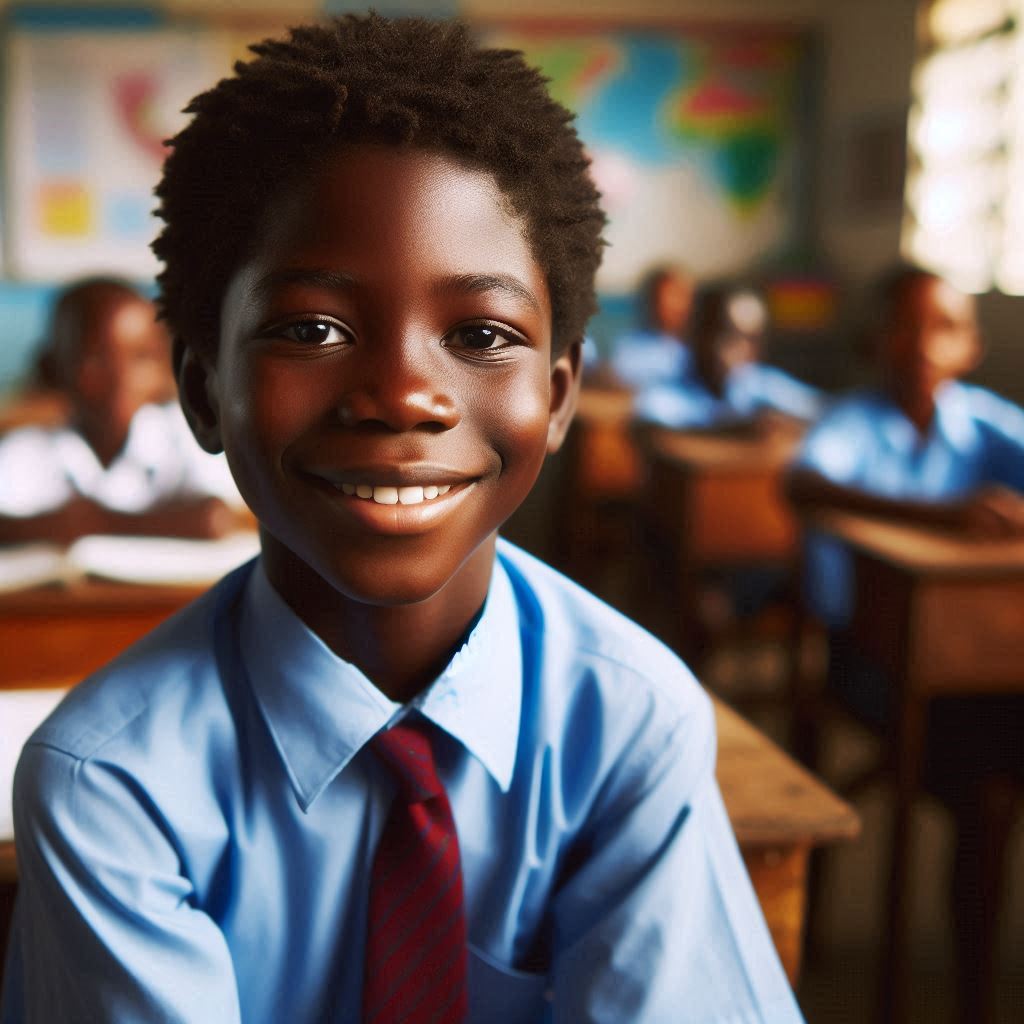Introduction
Special education needs in Nigerian primary schools demand urgent attention.
Addressing these needs is crucial for inclusive education. The support for special needs students ensures equal opportunities for all.
Define Special Education Needs
Special education needs refer to tailored educational services. These services support students with disabilities or learning difficulties.
They aim to provide equal learning opportunities for all children.
Importance of Addressing and Supporting Special Needs Students
Supporting special needs students fosters an inclusive learning environment. It promotes equality and reduces discrimination.
Early intervention in primary schools boosts their academic and social development. Special education helps students reach their full potential.
It prepares them for a more independent and productive future. Inclusive education benefits all students, encouraging empathy and diversity.
Challenges and Barriers Faced by Special Needs Students in Nigeria
The Nigerian education system faces many challenges in special education. There is a lack of trained special education teachers.
This shortage limits effective teaching strategies for special needs students. Inadequate funding hampers the provision of necessary resources and facilities.
Many schools lack the infrastructure to accommodate special needs. Stigma and discrimination persist, affecting students’ self-esteem and participation.
Additionally, there is insufficient awareness and understanding of special education needs. This leads to the neglect and marginalization of these students.
Addressing these challenges requires comprehensive policy implementation. Increased funding is essential for resources and teacher training.
Raising awareness can reduce stigma and foster inclusion. The government, communities, and stakeholders must collaborate to support special needs education.
Improving special education in Nigeria is a collective responsibility. By prioritizing these needs, we can create a more inclusive society.
Legal framework and policies for special education needs in Nigerian primary schools
When it comes to special education needs in Nigerian primary schools, it is crucial to examine the legal framework and policies that are in place to support children with disabilities.
In this section, we will explore the existing laws and policies that govern special education in Nigeria, highlight any gaps or shortcomings in the current legal framework, and discuss the implementation and enforcement of these laws and policies in primary schools.
Existing Laws and Policies
In Nigeria, the key legislation that addresses special education needs is the Educational Decree of 1977, which mandates the provision of special education services for children with disabilities.
This decree was later amended and integrated into the Education Act of 2004, further solidifying the government’s commitment to inclusive education.
Additionally, the Disability Rights Act of 2018 recognizes the rights of persons with disabilities, including their right to access quality education.
This act aims to ensure that children with disabilities are not discriminated against in the education system and have equal opportunities to learn and thrive.
Gaps and Shortcomings
Despite the existence of these laws and policies, there are several gaps and shortcomings in the current legal framework for special education in Nigeria.
One major issue is the lack of adequate funding and resources to support inclusive education initiatives.
Many primary schools do not have the necessary facilities, trained teachers, or specialized programs to cater to the diverse needs of children with disabilities.
Furthermore, there is a lack of awareness and understanding among educators, parents, and the general public about the importance of inclusive education.
This contributes to stigmatization and marginalization of children with disabilities, preventing them from fully participating in school activities and achieving their academic potential.
Implementation and Enforcement
Although Nigeria has made progress in enacting laws and policies to promote inclusive education, the implementation and enforcement of these measures remain a challenge.
Many primary schools struggle to comply with the requirements set out in the legislation due to limited resources and capacity.
As a result, children with disabilities continue to face barriers to accessing quality education.
There is also a lack of monitoring and evaluation mechanisms in place to ensure that schools are effectively implementing inclusive education practices.
Without proper oversight, there is a risk that children with disabilities will be left behind and denied their right to education.
In fact, while Nigeria has taken steps to improve special education needs in primary schools through its legal framework and policies, there is still much work to be done.
Addressing the gaps and shortcomings in the current system, improving implementation and enforcement mechanisms, and increasing awareness and support for inclusive education are essential steps towards ensuring that all children, regardless of their abilities, have equal access to quality education.
Read: Developing Reading Skills in Early Childhood
Types of special education needs commonly found in Nigerian primary schools
Various types of disabilities or conditions that may require special education support
Students with learning disabilities may struggle with reading, writing, or mathematics.
Those with intellectual disabilities may have difficulties with abstract thinking and problem-solving.
Physical disabilities include mobility impairments or health conditions that limit student’s movements.
Speech and language impairments affect a student’s ability to communicate effectively.
Autism spectrum disorders impact social interaction and communication skills.
Emotional and behavioral disorders may manifest as anxiety, depression, or conduct issues.
Prevalence and impact of these special needs on students’ learning and development
The prevalence of special education needs in Nigerian primary schools is significant.
Transform Your Career with Expert Guidance
Get personalized mentorship consulting that’s tailored to your unique path. Our expert advice is actionable and exclusive.
Get StartedThese special needs can greatly impact a student’s learning and development.
Students with disabilities often require individualized education plans and specialized support to thrive academically and socially.
Provide examples and case studies to illustrate these different types of special education needs
For example, a student with dyslexia may struggle with reading comprehension.
A case study of a child with autism may showcase challenges with social interactions and communication.
In contrast, a student with a physical disability may require assistive technology or modified classroom environments to support their learning.
Read: Importance of Play in Nursery Education
Challenges and barriers to providing adequate support for special needs students in Nigerian primary schools
Common challenges
- Lack of resources: Nigerian primary schools often lack the necessary resources to support special needs students.
- Trained teachers: There is a shortage of teachers with the proper training and expertise in special education.
- Facilities: Many schools do not have the proper facilities or equipment to cater to the needs of special needs students.
- Societal stigma: There is a prevalent stigma and discrimination towards individuals with special needs in Nigeria.
- Lack of awareness: Many people in Nigerian society lack awareness and understanding of special needs education.
- Limited funding: Schools often struggle with insufficient funding to provide the necessary resources for special needs students.
- Inadequate training: Teachers may not receive adequate training on how to support special needs students effectively.
- Poor infrastructure: Schools may lack the infrastructure needed to accommodate students with physical disabilities or other special needs.
- Lack of specialized materials: Schools may not have access to specialized teaching materials or tools for special needs students.
Societal stigma and discrimination towards special needs individuals in Nigeria
- Cultural beliefs: Some cultural beliefs in Nigeria contribute to the stigma surrounding special needs individuals.
- Lack of inclusion: Special needs individuals may face exclusion and discrimination in various aspects of society.
- Limited opportunities: Special needs individuals may have limited access to education, employment, and other opportunities.
- Advocacy needed: There is a need for advocacy and awareness campaigns to address the stigma and discrimination towards special needs individuals.
The need for awareness, advocacy, and support for special needs education
- Promoting inclusion: There is a need to promote inclusive education and create a supportive environment for special needs students.
- Advocacy efforts: Advocacy groups can play a crucial role in raising awareness and advocating for the rights of special needs individuals.
- Training programs: Implementing training programs for teachers and school staff can help improve support for special needs students.
- Government support: The government plays a key role in providing funding and policies to support special needs education in Nigeria.
In fact, addressing the challenges and barriers to providing adequate support for special needs students in Nigerian primary schools requires a multi-faceted approach involving resources, training, awareness, and advocacy.
Read: Nutritional Needs of Nursery and Primary Students

Strategies and initiatives for improving special education needs in Nigerian primary schools
Improving special education needs in Nigerian primary schools
In order to address the challenges faced by special needs students in Nigerian primary schools, various strategies and initiatives can be implemented to improve their educational experience and outcomes.
Here are some effective approaches:
- Training and capacity building for teachers: Providing specialized training for teachers on how to effectively support and cater to the needs of special education students is crucial.
This includes understanding different disabilities, learning styles, and best practices for inclusive education. - Collaborative teaching and peer support: Encouraging collaboration among teachers, special education professionals, and peers can create a supportive learning environment for special needs students.
Peer support programs can also help foster inclusivity and acceptance among students. - Individualized education plans (IEPs): Developing personalized IEPs for special needs students can help tailor their educational experience to their unique needs and abilities.
This includes setting specific goals, accommodations, and modifications to ensure their success.
Innovative approaches and best practices for inclusive education in primary schools
- Universal design for learning (UDL): Implementing UDL principles in curriculum development and instructional strategies can help create inclusive learning environments that cater to a diverse range of learners, including those with special needs.
- Assistive technology: Leveraging technology tools and devices can enhance the learning experience for special needs students by providing alternative ways to access information, communicate, and participate in classroom activities.
- Sensitization and awareness campaigns: Raising awareness about the importance of inclusive education and promoting acceptance and understanding of special needs students can help create a more inclusive school culture.
Role of government, NGOs, and educational institutions in promoting inclusive education
- Government support: The government plays a crucial role in providing funding, policy support, and resources to create inclusive education programs and initiatives.
This includes developing inclusive policies, regulations, and infrastructure to support special needs students. - NGO initiatives: Non-governmental organizations (NGOs) play a key role in advocating for the rights of special needs students, providing support services, and implementing innovative programs to promote inclusive education in primary schools.
- Educational institutions: Schools and educational institutions have a responsibility to create inclusive environments that accommodate the needs of all students, including those with disabilities.
This includes providing access to support services, accommodations, and specialized programs for special needs students.
Success stories and programs that have made a positive impact on special needs students in Nigeria
- Special Olympics Nigeria: Special Olympics Nigeria is an organization that provides sports training and competition opportunities for individuals with intellectual disabilities.
Their programs have helped promote inclusion, empowerment, and social integration for special needs students. - Inclusive schools pilot programs: Several pilot programs have been implemented in Nigeria to promote inclusive education in primary schools.
These programs have demonstrated positive outcomes in enhancing academic performance, social skills, and self-esteem for special needs students. - Community partnerships: Collaboration with local communities, businesses, and organizations has helped create support networks for special needs students in Nigeria.
These partnerships have facilitated access to resources, services, and opportunities for inclusive education.
Read: Parental Involvement in Early Childhood Education
Learn More: Nigerian Parents’ Guide to Computer Education
Collaboration and partnership for supporting special needs students in Nigerian primary schools
Importance of Collaboration
Collaboration among parents, teachers, administrators, and the community is crucial for the success of special needs students.
It ensures that everyone is aligned in supporting these students effectively.
Parents
- Parents play a significant role in understanding their child’s needs and communicating them to the school.
- They can provide valuable insights into their child’s strengths, weaknesses, and preferences.
Teachers
- Teachers are on the front lines of education and are responsible for implementing strategies to support special needs students.
- They should work closely with parents to create individualized education plans (IEPs) for each student.
School Administrators
- School administrators provide the necessary resources and support for teachers and parents to assist special needs students.
- They should promote a culture of inclusivity and support within the school environment.
Community
- The community can offer additional resources, support, and opportunities for special needs students to thrive.
- Collaboration with community organizations can enrich the educational experience of these students.
Benefits of Partnerships
Partnerships with special needs organizations, advocacy groups, and experts bring various benefits to Nigerian primary schools.
These partnerships provide resources, training, and knowledge to support special needs students effectively.
Special Needs Organizations
- Special needs organizations offer specialized expertise and resources to assist schools in meeting the diverse needs of their students.
- Collaboration with these organizations can enhance the quality of education and support available to special needs students.
Advocacy Groups
- Advocacy groups advocate for the rights and needs of special needs students and can provide valuable guidance to schools on inclusive practices.
- Partnerships with advocacy groups promote awareness and understanding of special education needs in the community.
Experts
- Experts in special education bring knowledge, skills, and best practices that can benefit both teachers and students in Nigerian primary schools.
- Collaborating with experts can lead to innovative strategies and solutions for supporting special needs students effectively.
Fostering a Supportive and Inclusive Environment
Creating a supportive and inclusive environment for special needs students in primary schools requires a concerted effort from all stakeholders.
Training and Professional Development
- Providing ongoing training and professional development for teachers on inclusive practices and strategies is essential.
- Teachers should have the necessary skills and knowledge to support the diverse needs of special needs students.
Creating Individualized Support Plans
- Developing individualized education plans (IEPs) for each special needs student ensures that their unique needs are met.
- IEPs should be created collaboratively with parents, teachers, and experts to address all aspects of a student’s development.
Promoting a Culture of Acceptance
- Creating a culture of acceptance and inclusivity within the school fosters a sense of belonging for special needs students.
- Students should be encouraged to support and respect their peers, regardless of their differences.
In a nutshell, collaboration and partnership are essential for supporting special needs students in Nigerian primary schools.
By working together, schools can create a more inclusive and supportive environment for these students to thrive.
Through partnerships with organizations, advocacy groups, and experts, schools can access valuable resources and knowledge to enhance the quality of education and support available to special needs students.
Learn More: Career Opportunities with a Technical Education
Explore Further: Auto Tech Workshops and Seminars in Nigeria
Conclusion
Addressing special education needs in Nigerian primary schools is crucial.
It is essential to provide adequate support to these students to ensure their overall development.
By summarizing the key points discussed in this blog post, it is evident that there is a pressing need for improved special education support in Nigeria.
Recognizing the significance of this issue, further research, advocacy, and action are necessary to enhance the quality of special education in Nigerian primary schools.
Every child deserves equal access to education and the resources necessary for their success.




